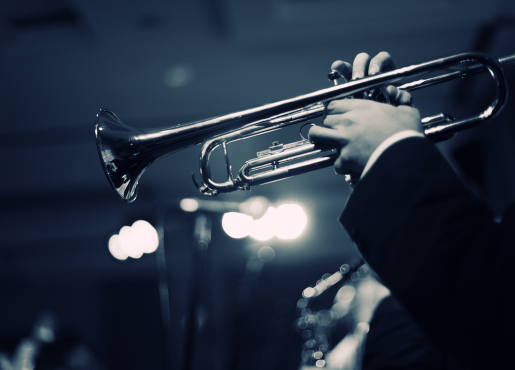
This Week on Jazz Spectrum – Yesterdays
By Fritz Byers
The Song of the Week is a regular feature of Jazz Spectrum; it typically occupies two sets, beginning at the top of the third hour of the show. I hope the segment has given listeners a tenth of the pleasure that putting it together, week after week, has given me.
The canon of American popular songs and show tunes, written for theater and movie musicals and commonly referred to as the Great American Songbook, is as rich a cultural achievement as I know of. The tunes stand on their own as landmarks of melodic and harmonic inventiveness and of verbal ingenuity. And they formed the essential source for the jazz repertoire from the rise of the music in the 1920s through the swing and be-bop eras, and into the competing methods of cool jazz and hard-bop that dominated the 1950s.

A salient aspect of the rise of the jazz avant-garde in the late 50s, and of its flourishing in the 1960s, is the eschewing of so-called “jazz standards” in favor of new, and often thornier, compositions. Of course, we don’t have to choose. While we can revere the geniuses of Tin Pan Alley, in the end what matters within jazz is what the musicians do with the raw materials, however and whenever they were constructed.
The Song of the Week explorations that we’ve been undertaking weekly for a decade on so on Jazz Spectrum are designed to first define the core elements of the tune and then, in a way that replicates the essential jazz process, gradually limn the implications, the possibilities of the song. Happily, the essential repertoire of jazz standards and their many interations over the history of jazz provide limitless resources to draw from. As I said, making the selections each week has been a source of real joy. We’ve done about five hundred so far. We can go on like this forever, or at least for long as I’m around.
This week, it’s “Yesterdays,” written in 1933 by the composer Jerome Kern and the lyricist Otto Harbach. The two of them are, separately and as a songwriting pair, in the pantheon of Tin Pan Alley legends.
Jerome Kern is among the most prolific and admired composers for the American theater. His familiar works include “All the Things You Are,” “Long Ago and Far Away,” “A Fine Romance,” and I’m Old Fashioned” – notably, each written with a different lyricist.
Similarly, Otto Harbach wrote lyrics and librettos with many of the most acclaimed composers of the time, including Vincent Youmans, George Gershwin, and Sigmund Romberg. His stature in the field is embroidered, to say the least, by the fact that the great lyricist, Oscar Hammerstein II, was his protégé.
Kern and Harbach’s greatest sustained collaboration was in writing the music, the lyrics, and the book for the Broadway musical, Roberta, originally called Gowns for Roberta after the source novel. The entire work is noteworthy. But its two centerpieces are enduring classics: “Smoke Gets in Your Eyes” became an immediate hit. We’ll get to that sometime soon.
For now, “Yesterdays.” The original copyrighted sheet music for the tune is titled in the singular – “Yesterday” – but I think that has to be a transcripionist’s error. It’s unimaginable that Harbach, a consummate and clever rhymer, would have have failed to pair the wonderful “sequester’d days” with its natural match, the plural “yesterdays.”
The lyrics are marvelously evocative, the melody is both natural and suprising, and the harmonies, both obvious and implied, are entrancing. This is a great American song.
The first version of the song is Billie Holiday’s, recorded for the Commodore label on April 20, 1939 with Frank Newton & the Café Society Band (although the leader, the trumpeter Frank Newton, sits out on this track.). The recording quality is miserable, and the balance is entirely out of whack. But Billie said several times the song was among her favorites, and even in this rendition, her affection for it, and her incomparable way with a lyric, shine through.
Then the pianist Art Tatum has his typically labrynthine way with the tune, leaving the listener to wonder, how many hands are playing this?
Ella Fitzgerald performs in an aptly lush setting, and the first of the two sets ends with the all-too-often-overlooked trumpeter, Dizzy Reece, with a quartet recorded in 1960
The second batch of versions opens with a personal favorite: the singer Helen Merrill, from her debut album, in a track that opens with, and later features, the trumpet artistry of Clifford Brown in a setting arranged by Quincy Jones.
After the trombonist Curtis Fuller, alongside the underrated tenorist Sal Nistico, works out on the tune, you’ll hear the pianist and singer Patricia Barber in an affectingly moody version. And the set concludes with a gentle piano treatment by Marc Copland with the bassist Gary Peacock and the drummer Bill Stewart. About a minute and half into this track, Marc yields to Gary for a bass solo that, for more than a minute, captures the heartache at the heart of the song.
- Home
- Schedules
- TV
- TV
- Local TV Programs
- Business | Life 360 with Kristi K.
- Toledo Stories
- To The Point with Doni Miller
- Listening with Keith Burris
- Ideas & Insights
- WGTE Presents
- BL360: Northwest Ohio Innovation Consortium
- Magic of the Old West End
- Freedom Means Never Surrender
- I&I: The Random Factor
- FF: National Cherry Festival
- TTP: Moms Demand Action For Gun Sense in America
- Watch Live
- Radio
- Education
- Community
- Support
- About
- Donate
- Watch Live



